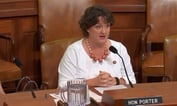All tax executives at U.S. public companies think tax reform is somewhat likely under the Trump administration, and 60% said reform was very likely, according to the annual BDO Tax Outlook Survey.
However, 51% of tax executives said congressional gridlock would be the primary barrier to tax reform over the next four years, while 19% pointed to conflicting legislative priorities, 13% to public opposition to proposed reforms and 12% to international actions related to multinationals.
“Despite the widely debated initiatives discussed during President Trump’s first months in office, steering federal tax reform is more like an aircraft carrier than a speedboat,” Matthew Becker, partner in BDO USA’s national tax practice, said in a statement. “It takes time and effort to change course.
“Any changes that do come to pass may look significantly different than what’s being proposed today, so businesses should stay abreast of how the potential outcomes could impact their bottom line and remain ready to pivot their tax planning strategies when important developments arise.”
Executive interviewers at Market Measurement conducted a national telephone survey for BDO USA, speaking directly to 100 tax executives at public companies.
Asked which tax policy changes were on their wish list, 40% of tax directors hoped for a reduction of the 35% corporate tax rate, according to the survey. Other desired changes:
- Tax incentives to repatriate foreign earnings: 20%
- Shift to a territorial tax system: 17%
- Simplified tax code: 12%
- Lower tax burden on capital gains: 9%
Just 2 percent cited changes to the tax treatment of carried interest, which both presidential candidates discussed during last year’s election campaign.
In addition, 34% of respondents said planning for federal tax reform was their primary tax concern in 2017, up from 21% in 2016.
BDO USA said that given comments by both Republicans and the president on reforms — ranging from cutting investment income taxes to enacting a border adjustment tax — businesses would likely be adapting to a changing landscape throughout the coming year.
International Tax Planning
The survey found that major efforts on the international stage remain a source of anxiety for tax executives. Eighty-two percent of the companies polled conduct operations outside of North America, and 54% reported plans to enter or expand into international markets this year.
Thirty-five percent of tax executives said international tax planning was their chief tax issue in 2017.
This will not be easy, BDO USA said, especially since the Organization for Economic Cooperation and Development published an action plan in 2015, designed to address tax base erosion and profit shifting (BEPS) — tax planning strategies that exploit gaps and mismatches in tax rules to artificially shift profits to low or no-tax locations where there is little or no economic activity.
BEPS recommendations around transfer pricing generate the greatest concern among tax executives, cited by 51% of survey respondents.
Their concern is valid, BDO USA said, as 76% of respondents currently include transfer pricing mechanisms in their tax strategy.








 March 13, 2017 at 09:31 AM
March 13, 2017 at 09:31 AM










